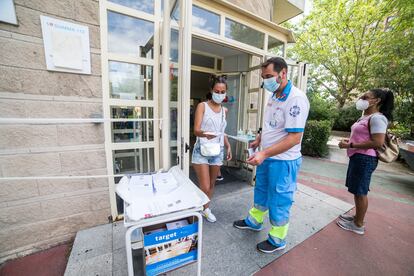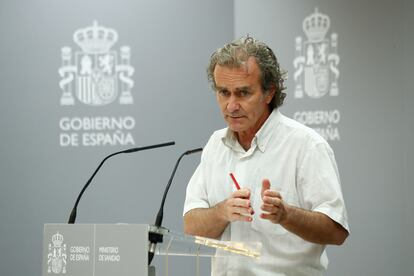With 7,039 new coronavirus cases in Spain, ministry warns: ‘Things are not going well’
Health official Fernando Simón explained on Thursday that while “the epidemic is not out of control on a national level,” it is in some specific areas of the country

Fernando Simón, the director of the Health Ministry’s Coordination Center for Health Alerts and the visible face of the Spanish government during the ongoing coronavirus crisis, voiced a message of warning to citizens on Thursday given the constant increase in new cases and deaths that Spain has been seeing in recent weeks. “No one should have any doubts,” he said. “Things are not going well.” The ministry last night reported 7,039 new infections, 3,349 of them in the last 24 hours.
The Health Ministry admitted that while the increase in detected cases has brought the country to a situation where “the epidemic is not out of control on a national level,” it is in some specific areas of the country.
If we continue to allow this to rise, even if the cases are mild, we will end up with many people in the hospital, many admitted in intensive care and many deadFernando Simón
With a tone that contrasted with his usual calm approach, Simón made clear that “there continues to be transmission [of the virus] and every day there is more.” He warned that “if we continue to allow this to rise, even if the cases are mild, we will end up with many people in the hospital, many admitted in intensive care and many dead.”
The message from the health official came a day after the ministry reported a significant rise in Covid-19 deaths, which reached 131 for the last seven days – 11 times higher than the 12 victims reported just a month ago.
The data reported yesterday was also bad, and continued the upward trend seen over the last two weeks. The ministry reported 7,039 new cases, of which 3,349 were diagnosed on Wednesday and the remainder on previous days. Madrid continues to top the list for new cases, with 2,344, followed by Catalonia (1,095), Andalusia (599), the Basque Country (544), Castilla y León (388) and Aragón (350).
The number of people hospitalized in the last seven days now stands at 1,407, nearly double the figure for a week ago
The incidence rate over the last two weeks has also risen once more, to 142 cases per 100,000 inhabitants. Cases detected where symptoms began in the last two weeks, one of the most-valued indicators by the experts in terms of monitoring the progress of the pandemic, came in at a new record high of 21,000.
The number of people hospitalized in the last seven days now stands at 1,407, nearly double the figure for a week ago, while the number of new intensive care unit admissions has grown at the same speed, with 90 new patients.
The number of deaths, however, did not rise significantly. Sixteen new victims were reported on Thursday, while the number of victims over the last seven days fell slightly to 122. Simón admitted that the data is still subject to delays given that the regions report their figures to the central Health Ministry before the reports are released and that there could be variations in the coming days.
“There are ways of having a good time without putting anyone at risk,” Simón repeated on Thursday, in reference to bars and nightclubs proving to be an important source of contagion in recent weeks. “The professionals in this sector need to see that people can have fun without putting anyone around them at risk. And those around them are not those that are there at the time, but also those that are going to be with their contacts.” He was referring to the chains of contact that begin among younger people but that end up reaching at-risk groups such as seniors.

“It is not good enough to say that I am young and I’m not going to suffer and it doesn’t matter, because we know that each youngster ends up causing cases in their families and among older and vulnerable people,” he said, calling out to “influencers” on social media to “help contain the epidemic” with the major visibility and impact they have among young people.
“I understand that people want to go out and party, but there are ways of partying,” he continued. “I believe that all of those who have the capacity to influence the population should be educating people as to what has to be done.”
As an example, Simón cited what had happened in the countryside with seasonal workers, among whom there were initially several serious outbreaks but that were later brought under control with the “efforts of the administrations, companies and the workers themselves.”
Simón also had some positive messages on Thursday, reporting that the “cases are different” from those seen in March, when the crisis took hold. “They are very young, with an average age among women of 39 and in men of 37. At the peak of the epidemic it was 62 or 63, and two months ago it was 53.”
This is the case, he continued, because “a very large number of PCR tests are being carried out, around 60,000 a day, “and they are being done in zones where there is transmission, which allows them to be properly focused.” He added that many asymptomatic and mild cases were being detected, meaning that the “hospitalization rates are low.” These are, he explained, “currently around 4%, well below the 55% or more that was seen during the peak of the pandemic.”
Simón also explained that the fatality rate was also lower, and was now around 0.4%, adding that the current detection rate in terms of new cases “is what we should be detecting according to the seroprevalence survey.”
But after these optimistic data, the official wanted to repeat his warning: “We cannot allow for this to get out of hand once more.”
English version by Simon Hunter.
Tu suscripción se está usando en otro dispositivo
¿Quieres añadir otro usuario a tu suscripción?
Si continúas leyendo en este dispositivo, no se podrá leer en el otro.
FlechaTu suscripción se está usando en otro dispositivo y solo puedes acceder a EL PAÍS desde un dispositivo a la vez.
Si quieres compartir tu cuenta, cambia tu suscripción a la modalidad Premium, así podrás añadir otro usuario. Cada uno accederá con su propia cuenta de email, lo que os permitirá personalizar vuestra experiencia en EL PAÍS.
¿Tienes una suscripción de empresa? Accede aquí para contratar más cuentas.
En el caso de no saber quién está usando tu cuenta, te recomendamos cambiar tu contraseña aquí.
Si decides continuar compartiendo tu cuenta, este mensaje se mostrará en tu dispositivo y en el de la otra persona que está usando tu cuenta de forma indefinida, afectando a tu experiencia de lectura. Puedes consultar aquí los términos y condiciones de la suscripción digital.









































